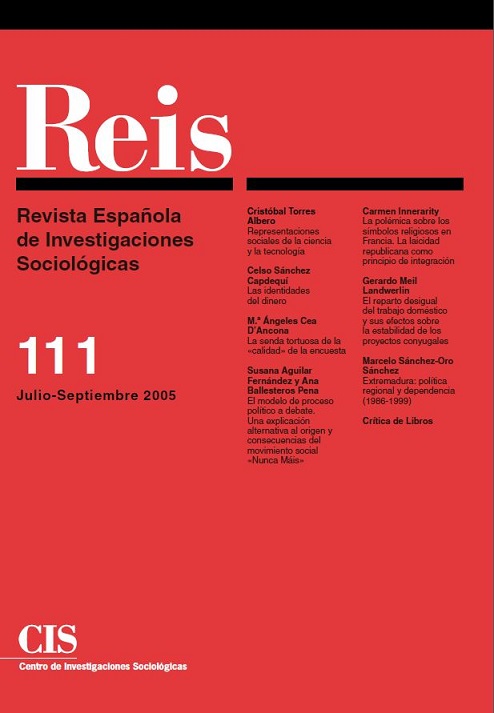El modelo de proceso político a debate. Una explicación alternativa al origen y consecuencias del movimiento social "Nunca Máis"
DOI:
https://doi.org/10.5477/cis/reis.111.105Keywords:
Social Movements, The Political Process Model, Tarrow, Collective ActionAbstract
In the aftermath of the disastrous spillage of the oil tanker Prestige in November 2002 off the coast of the region of Galicia in north-western Spain, the denial of the magnitude of the disaster by the Popular Party (PP) government led to the emergence in Galicia of the social movement Nunca Máis (Never Again). Nunca Máis has played leading role in the citizens’ protest at the regional and national PP governments’ mismanagement of the ecological and economic crisis caused by the spillage, and has also extended its agenda to embrace the nationwide protests against the war of 2003 in Iraq. The first question to be addressed is why Nunca Máis emerged as late as 2002, given that numerous spillages have taken place over the last three decades off the Galician coast. In contrast to Sidney Tarrow (1998), who resorts to the political opportunity structure in order to account for the timing of protests, we focus on the role of already existing social networks and the appearance of suddenly imposed grievances (in the form of moral shock, which the Prestige accident constituted) in order to understand when the profest arose. A second question to be tackled concerns the consequences of Nunca Máis, or why the movement fell short of the widespread expectations of political change which it had created.
Downloads
Downloads
Published
How to Cite
Issue
Section
License
Copyright (c) 2024 Revista Española de Investigaciones Sociológicas

This work is licensed under a Creative Commons Attribution-ShareAlike 4.0 International License.
Permite Compartir — copiar y redistribuir el material en cualquier medio o formato, Adaptar — remezclar, transformar y construir a partir del material para cualquier propósito, incluso comercialmente.








